BYZANTIE
| Just as with their forefathers in Rome, the power and glory of the emperors of Byzantium shines forth like a beacon. Some lands are directly under their sway. In others their name is whispered with awe. For more than a thousand years, since Rome was lost to the barbarians, the city of Constantine and its empire has stood as an island of civilization in a cruel and barbarous world. Long may it endure! | |||
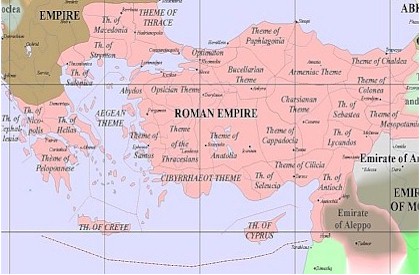
Byzantine Influeance 1000 |
Important dates and summary | ||
| 1071 : Defeated by SELJUK Turks at Manzikert. This defeat led to the loss of almost all of Anatolia 1095 : The pope is asked for help against the Seljuks – he responded by summoning Western European Knights to come to the aid of the Christians in the East. So began the Crusades. 1202 – 04 : The Fourth Crusade, under Venetian influence, attacked Constantinople. The Crusaders stormed the city, and crowned Baldwin of Flanders as first Latin Emperor of Constantinople and partitioned the Empire between them. The Latins did not succeed in occupying the entire Empire, and centers of resistance grew.. 1204, The Empire was severely weakened in the Balkans, Bulgaria re-asserted its independence and then captured large areas of Thessaly, Macedonia and Thrace. Serbia also gained independence 1261 : The Byzantine empire was restored with the capture of Constantinople from the Latin’s in 1261. 14century : The Ottoman empire took control of Anatolia and then the Balkans. 1394 : The Byzantine Empire was reduced to a rump area around Constantinople and the Peloponnese 1453 : Mehmet II of the Ottomen Empire laid siege to Constantinople, and finally took the city, putting an end to more than 1000 years of Byzantine History and inflicting a bitter psychological blow to Christendom. |
|||
| Byzantine was the eastern remains of the Roman empire after its fall. At its height it controlled most of the former empire with the notable exceptions of France, Germany, Northern Spain and Britain. however, by the end of the 11th century the empire was in major decline.
In 1060 Robert Guiscard drove the Byzantines out of Calabria, in 1071 he captured Bari and Brindisi, the main centers of Byzantine in Italy. The lombard principality of Salerno followed in 1077 and in 1081 he crossed the Adriatic and captured Corfu. Sicily followed but was not completed until 1090, even though Messina was captured in 1061 and Catania in 1071. |
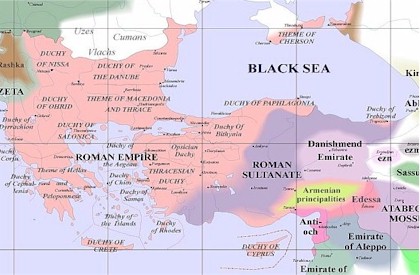 Byzantine Influeance 1100 |
||
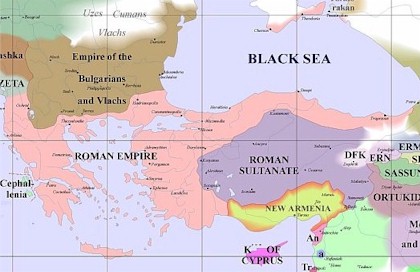 Byzantine Influeance 1200 |
Byzantium was also unable to defend her frontiers closure to home. The Byzantine military found themselves starved of funds, and a much weakened army was smashed by Seljuk Turks at Manzikert in 1071.The defeat was followed by the loss of almost all of Anatolia. The Empire managed to retain its grip on most of the Balkans except for Croatia which it lost to Hungrey in 1091.
Due to these loses, the emporer in March 1095 asked the pope for help against the Seljuk Turks who were now threatening there capital in Constantinople modern day Istanbul.)
|
||
| Pope Urbans II responded by summoning Western European Knights to come to the aid of the Christians in the East. So began the Crusades.
The Crusades contributed to an expansion of Byzantine control in Western and Southern Anatolia, but this was short lived with the of the Seljuks of Rum at Myriocephalum in 1176. By 1204, the Empire had been severely weakened in the Balkans, Bulgaria has re-asserted its independence and then captured large areas of Thessaly, Macedonia and Thrace. Serbia also gained independence. The Ottomans pushed through Anatolia and then into the Balkans. The Byzantine Empire was reduced to a rump area around Constantinople and the Peloponnese. The most bitter blow was the fall of Salonica to the Turks in 1387. |
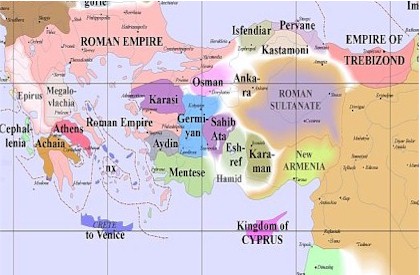 Byzantine Influeance 1300 |
||
| The move of the Ottoman capital to Adrainople in 1402 symbolized a shift in emphasis to Europe, Constantinople was reprieved. In 1453 Mehmet II of the Ottomen Empire laid siege to Constantinople, and finally took the city, putting an end to more than 1000 years of Byzantine History and inflicting a bitter psychological blow to Christendom. | |||
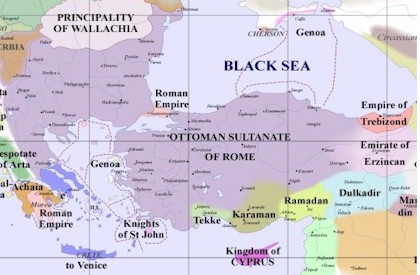 Byzantine Influeance 1400 |
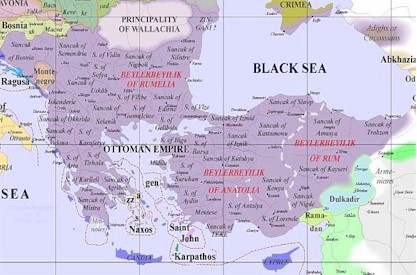 Byzantine Influeance 1500 |
||
